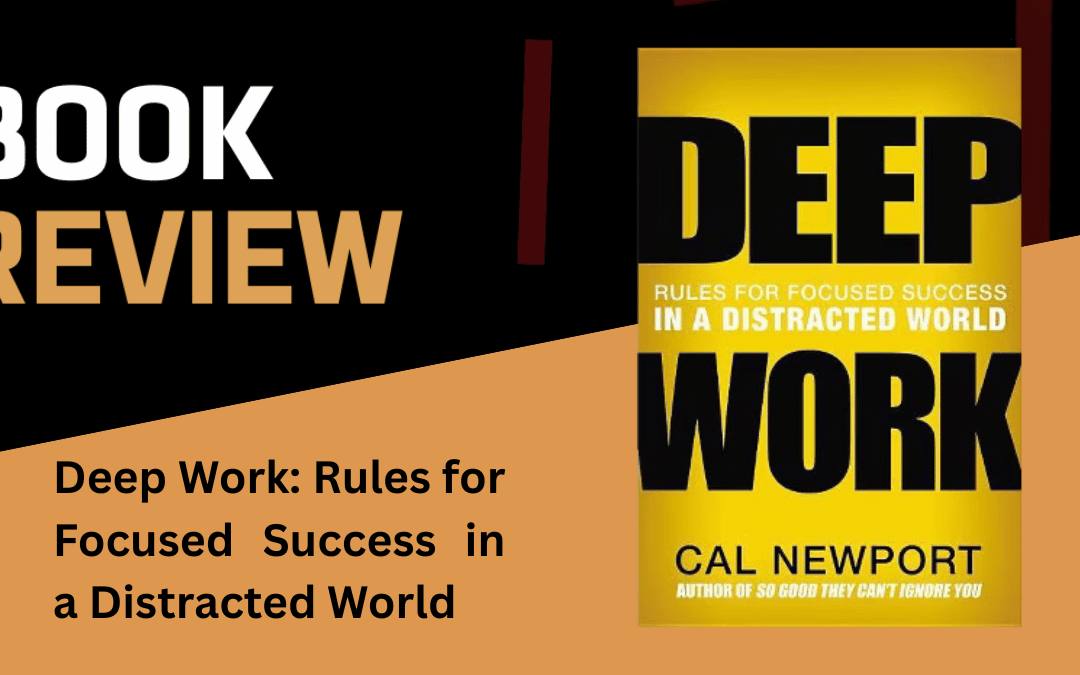I’ll be honest. I didn’t expect much when I picked up Deep Work by Cal Newport. It sounded like another productivity book trying to fix my brain. But a few pages in, I realized this one was different.
Newport doesn’t dance around the problem. We’re distracted. Constantly. And the scary part is, we’ve started to accept it as normal.
He argues that deep focus—not just focus, but real, uninterrupted thinking—is the key to doing meaningful work. Not more work. Just better work.
I wasn’t sure I bought it. I’ve spent years juggling tasks. Writing while checking messages. Planning while half-listening to a podcast. It felt efficient. But Newport made me wonder if I was just getting really good at doing a lot of… nothing important.
So I tested his ideas. I tried what he calls “deep work.” No phone. No tabs open. Just me and the task.
It was uncomfortable. I didn’t love it at first. My brain felt jumpy, like it was trying to escape. I reached for distractions that weren’t there. But I stuck with it. After a few days, something strange happened. I stopped fighting the silence. I got more done. And the work actually felt good.
That surprised me.
Newport splits work into two camps. Deep work is hard and valuable. And shallow work, which is easy but kind of empty. Emails. Zoom calls. Slack messages. He’s not saying never do them. But don’t let them run your day.
And he’s right. That’s exactly what I was doing before.
One idea that stuck with me is “embracing boredom.” Not checking your phone the second you feel a pause. Just letting your mind be still. I forgot how weird that feels. Also how creative it can be.
I remember leaving my phone in the other room for an hour one afternoon. I thought I’d go crazy. But instead, I ended up outlining a full article that had been stuck in my head for weeks. Coincidence? Maybe. But probably not.
Newport’s advice about quitting social media is where I started to push back a little. He argues for eliminating it entirely. I get the logic. But for most of us, it’s not that simple. Social media is how we connect, promote, learn. For me, it’s part of my work.
Still, I’ve changed how I use it. No scrolling while I’m writing. No checking it when I’m supposed to be thinking. I’ve turned off more notifications. I don’t feel perfect, but I do feel better.
That’s kind of the point of the book. It’s not about being perfect. It’s about being present.
I’ve reviewed a few nonfiction books on my blog before. The Power of Now comes to mind. That one was more spiritual. This one’s more practical. But they meet in the middle. Both say: Be here. Now. Fully.
There’s a calmness to deep work I didn’t expect. It’s not always easy. Sometimes I stare at the screen and want to run. But when I stay, I tap into something I didn’t know I was missing.
Newport lays out rules, yes, but the book isn’t rigid. You can pick what works. You can tweak it. That’s why it stuck with me. It felt doable.
Since reading it, I’ve been blocking out a couple hours a day with no distractions. I don’t always get it right. Sometimes I give in and check email. Other days, I slip into a zone and barely look up. Those days feel like small victories.
Would I recommend Deep Work? Absolutely. Especially if you’re tired of feeling busy but not accomplished.
Just don’t expect it to fix everything overnight. That’s not how this works. But it will help you notice what’s broken—and give you tools to rebuild it.
You can read more of my book reviews or browse my journal if you’re curious what else I’ve been reading or reflecting on lately.
Also, if you liked this one, you might enjoy my review of Greed is God by Sadhguru. Like Newport, he has a way of making you stop and think about how you’re spending your energy.
Bottom line: Deep Work won’t change your life in a flash. But it will ask you to pay attention. To what you do. How you do it. And why.
Sometimes that’s all the change we really need.


